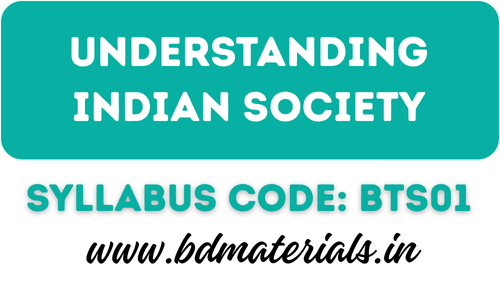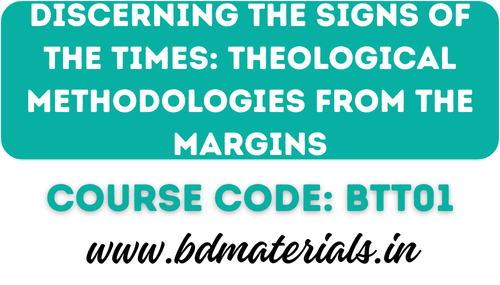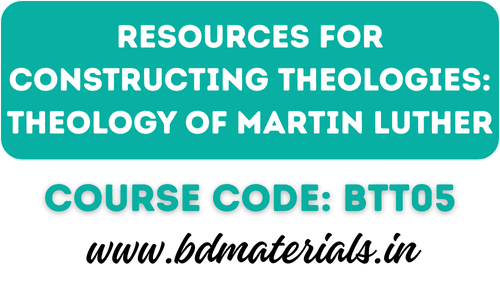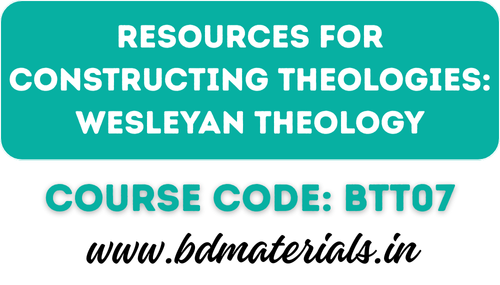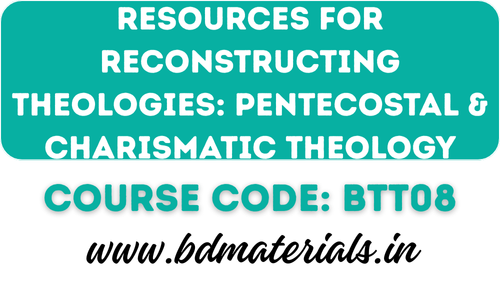Course Code: BTS01
Understanding Indian Society
Course Details
- Course Code: BTS01
- Course Title: Understanding Indian Society
- Semester: II
- Credit Hours: 4
- Assessment: Senate Paper
- Final Examination: 100%
Course Objectives
- Conceptual and Analytical Clarity: Enable students to gain clarity about Indian society through various social theories, facilitating meaningful theological and ethical reflections.
- Critical Understanding of Societal Problems: Challenge students to critically analyze societal issues that threaten the dignity and rights of individuals, fostering their capacity to evaluate different approaches to these problems.
- Interdisciplinary Perspectives: Encourage students to adopt interdisciplinary perspectives to address exploitation and oppression in India.
- Engagement with Social Realities: Provide opportunities for deeper engagement with social movements, promoting alternative social transformations relevant to ministerial formation.
Pedagogical Methods
- Lectures
- Readings
- Film screenings
- Group discussions
Primary Texts:
- Towards Understanding Indian Society by Gabriele Dietrich and Bas Wielenga (Tiruvalla: CSS Books, 2009)
- Key Concepts in Critical Social Theory by Nick Crossley (London: Sage Publications, 2005)
Course Outline
SECTION A: METHODOLOGICAL CONSIDERATIONS
UNIT I: Significance of Social Analysis for Doing Theology
UNIT II: Different Approaches for Understanding Society
- Karl Marx, Max Weber, Emile Durkheim
- Post-Marxist Understanding: Pierre Bourdieu and Bruno Latour
UNIT III: Francois Huotart’s Framework of Social Analysis
UNIT IV: Analyzing Indian Economy
- Landlessness
- Production Processes (Labour and Technology)
- Market Economy
- Capitalism and Globalization in India
UNIT V: Analyzing Indian Society
- Class as a Methodological Category
- Caste as a Methodological Category
- Gender as a Methodological Category
- Ethnic Identity in North East India as Methodological Category
SECTION B: ISSUES AND RESPONSE
UNIT VI: Analyzing Indian Polity I
- Nation State: India as a Nation-state
- State and Power: Ideology and Power (Michel Foucault, Gramsci)
- Civil Society: Partha Chatterjee, Jurgen Habermas, Nancy Fraser
- Self-determination and State Terrorism
UNIT VII: Analyzing Indian Polity II
- Major Political Ideologies and Movements: Gandhism, Socialism, Communism
- Dalit, Bahujan, Adivasi, and Tribal Politics
- Subaltern Politics and Social Movements
UNIT VIII: Religion as Ideology
- Major Religious Ideologies: Hindutva Politics, Islam, and Christian Fundamentalism
- Religion and Minorities in India
- Religion for Social Transformation
UNIT IX: Towards Alternative Politics for Social Transformation in India
- New Social Movements in Development Discourse and Environmental Crisis
- Tribal Methods of Peacebuilding
- Role of Religion in Alternative Politics
UNIT X: Church in the World: Implications for the Mission and Ministry of the Church in India
Bibliography
Basic Books
- Ambedkar, B.R. Annihilation of Caste (New Delhi: Critical Quest, 2007).
- C.T. Kurien. Global Capitalism and Indian Economy (Delhi: Orient Longman, 1994).
- Gail Omvedt. Reinventing Revolution: India’s New Social Movements (New York: Sharpe, 1993).
- Geetha, V. Gender (Delhi: Popular Prakashan, 2002).
- T.K. Oommen. Protest and Change: Studies in Social Movements (New Delhi: Sage, 1990).
Supplementary Readings
- A. Melucci. “The Symbolic Challenge of Contemporary Movements,” Social Research 52/4 (1985): 789-816.
- Achin Vanaik. “The New Indian Right,” New Left Review (May-June, 2001): 43-67.
- Achin Vanaik. Communalism Contested: Religion, Modernity and Secularization (New Delhi: Visthar, 1997).
- Aditya Nigam. “Marxism and Power,” Social Scientist 24/4-6 (1996): 3-22.
- Aijaz Ahmad. “Right-Wing Politics and the Cultures of Cruelty,” Social Scientist 27/9-10 (1998): 3-25.
- Alain Touraine. “An Introduction to the Study of Social Movements,” Social Research 52/4 (1985): 749-87.
- Alex Inkeles. What is Sociology? An Introduction to the Discipline and Profession (New Delhi: Prentice Hall of India Pvt. Ltd., 1997).
- Ambedkar, B.R. “Castes in India: Their Mechanism, Genesis and Development,” in Dr. Babasaheb Ambedkar: Writings and Speeches, vol. 1 (Bombay: Education Department, Government of Maharashtra, 1996), 3-22.
- Andre Gunder Frank and Marta Fuentes. “Nine Theses on Social Movements,” Economic and Political Weekly (August 29, 1987): 1503-10.
- Areeparampil Mathew. Struggle for Swaraj: History of Adivasi Movement in Jharkhand (Chaibasa: Tribal Research and Training Centre, 2002).
- Arundhati Roy. The Greater Common Good (Bombay: India Book Distributor, 1999).
- Bas Wielenga. Towards an Eco-Just Society (Bangalore: CSA, 1999).
- Bastiaan Wielenga. Introduction to Marxism (Bangalore: Centre for Social Action, 1984).
- Benedict Anderson. Imagined Communities: Reflections on the Origin and Spread of Nationalism (Verso, 1991).
- Bhaskaran and C.K. Janu. Mother Forest: The Unfinished Story of C.K. Janu (New Delhi: Women Unlimited, 2004).
- Brian S. Turner. “The Body Politic: The Secularisation of Sovereign Bodies,” in Max Weber: From History to Modernity (London & New York: Routledge, 1992), 139-59.
- Bruno Latour. “Mixing Human and Non-Human Together: The Sociology of a Door-Closer,” Social Problems 35/3 (1988): 298-310.
- Bruno Latour. Reassembling the Social: An Introduction to Actor-Network Theory (Oxford: Clarendon, 2005).
- Carole Pateman. “Genesis, Fathers and the Political Liberty of Sons,” in The Sexual Contract (Cambridge: Polity, 1988), 77-115.
- Carolyn M. Elliot. Civil Society and Democracies: A Reader (New Delhi: OUP, 2003).
- Christine Delphy. “Thinking Gender: What are the Problems?,” in French Feminism: An Indian Anthology, edited by Haase-Dubose, Danielle et al. (New Delhi: Sage Publications, 2003).
- Craig Calhoun. “Introduction: Habermas and the Public Sphere,” in Habermas and the Public Sphere, edited by Idem (Cambridge: MIT Press, 1992), 1-48.
- Crossley, Nick. Key Concepts in Critical Social Theory (London: Sage Publications, 2005).
- Dipesh Chakrabarty. “A Small History of Subaltern Studies,” in Habitations of Modernity: Essays in the Wake of Subaltern Studies (Chicago: University of Chicago Press, 2002), 3-19.
- Emile Burns. What is Marxism? (Delhi: People’s Publishing House, 1999).
- Frederich Engels. The Origin of the Family, Private Property and the State (Moscow: Progress Publishers, 1972).
- Gabriele Dietrich. Women’s Movement in India: Conceptual and Religious Reflections (Bangalore: Breakthrough Publications, 1988).
- Gopal Guru. “Mapping Dalit Politics in India,” Vikalp 5/5 (1996): 53-9.
- Gopal Guru. “Understanding the Category ‘Dalit’,” Vikalp 6/2 (1998): 57-66.
- Harriet Bradley and Gail Hebson. “Breaking the Silence: The Need to Re-articulate ‘Class’,” International Journal of Sociology and Social Policy 19/9,10&11 (1999).
- Homi K. Bhabha. “DissemiNation: Time, Narrative and the Margins of the Modern Nation,” in Nation and Narration, edited by Idem (New York and London: Routledge, 1990).
- Jacques Pouchepadas. “‘Subaltern Studies’ as Post-colonial Critique of Modernity,” in Remapping Knowledge: The Making of South Asian Studies in India, Europe and America, 19th-20th Centuries, edited by Jackie Assayag and Veronique Benei (Gurgaon: Three Essays Collective, 2005).
- Judith Butler. “Subjects of Sex/Gender/Desire,” in Gender Trouble: Feminism and the Subversion of Identity (London & New York: Routledge, 1990), 1-46.
- Jurgen Habermas. “The Public Sphere,” in Readings in Contemporary Political Sociology, edited by Kate Nash (Massachusetts and Oxford: Blackwell, 2000), 288-94.
- Kamla Bhasin. Exploring Masculinity (New Delhi: Women Unlimited, 2004).
- Karl Marx and F. Engels. Manifesto of the Communist Party (New Delhi: People’s Publishing House, 1888).
- Kenneth Thompson. Emile Durkheim (London & New York: Routledge, 2002).
- Lasetso, Razouselie, Shimray, S. et al. (eds.). In Search of Peace: Tribal Resources for Peacebuilding in North East India (Jorhat: ILEMA, 2013).
- Lasetso, Razouselie & Yangkahao Vashum, eds. Tribal Christian Theology – Methods and Sources, for Constructing a Relevant Theology for the Indigenous People of North East India (Jorhat: ETC Program Coordination, 2007).
- Longchar, A.Wati. ed. No More Guns: People’s Struggle for Justice: Focus on North East India (Jorhat: Tribal Study Centre, ETC, 2006).
- Louis Althusser. “Ideology and Ideological State Apparatuses: Notes towards an Investigation,” in Lenin and Philosophy and Other Essays (Delhi: Alankar Books, 2006).
- Louis Dumont. Homo Hierarchicus: The Caste System and its Implications (Delhi: Vikas Publications, 1966).
- Mahanti, Neeti. Tribal Issues: A Non-Conventional Approach (New Delhi: Inter-Indian Publications, 1994).
- M.K. Gandhi. Hind Swaraj or Indian Home Rule (Ahmedabad: Navajivan Publishing House, 1938).
- M.M. Thomas. Secular Ideologies of India and the Secular Meaning of Christ (Bangalore: CISRS/CLS).
- Mary E. John and Janaki Nair. “A Question of Silence? An Introduction,” in A Question of Silence: The Sexual Economies of Modern India, edited by Idem (London & New York: Zed Books, 1998), 1-51.
- Mary E. John. Women’s Studies Reader (Delhi: Penguin Books, 2008).
- Michel Foucault. “The Eye of Power,” in Power/Knowledge: Selected Interviews and other Writings 1972-1977 (New York: Pantheon Books, 1980), 146-165.
- Michel Foucault. “The Subject and Power,” in Readings in Contemporary Political Sociology, edited by Kate Nash (Massachusetts & Oxford: Blackwell Publishers, 2000), 8-26.
- Nancy Fraser. “Politics, Culture, and the Public Sphere: Toward a Postmodern Conception,” in Social Postmodernism: Beyond Identity Politics, edited by Linda Nicholson and Steven Seidman (Cambridge: Cambridge University Press, 1995), 287-312.
- Nick Crossley. “Habitus, Capital and Field: Embodiment in Bourdieu’s Theory of Practice,” in The Social Body: Habit, Identity and Desire (London: Sage, 2001), 91-119.
- Nivedita Menon. “Outing Heteronormativity: Nations, Citizens, Feminist Disruptions,” in Sexualities, edited by Idem (New Delhi: Women Unlimited, 2007), 3-51.
- Omprakash Valmiki. Joothan: A Dalit’s Life, translated by A.P. Mukherjee (New York: Columbia University Press, 2003).
- Pachuau, Lalsangkima. Ethnic Identity and Christianity (Frankfurt am Main: Peter Lang, 2002).
- Partha Chatterjee. “On Civil and Political Society in Postcolonial Democracy,” in Civil Society, edited by S. Kaviraj and S. Khilnani (Cambridge: CUP, 2001), 165-178.
- Partha Chatterjee. “The Nationalist Resolution of the Women’s Question,” in Recasting Women: Essays in Colonial History, edited by Sangari, Kumkum and Vaid, Sudesh (New Delhi: Kali for Women, 1989), 233-253.
- Patricia Adair Gowaty. “Sexual Natures: How Feminism Changed Evolutionary Biology,” Signs 28/3 (2003): 901-21.
- Ponna Wignaraja. New Social Movements in the South: Empowering the People (London: Zed Books, 1993).
- Richard Jenkins. Pierre Bourdieu (London & New York: Routledge, 1992).
- Robin Jeffrey. “Introduction: Capitalism, Politics and the Indian-Language Press, 1977-1999,” in India’s Newspaper Revolution (New Delhi: Oxford University Press, 2000).
- Rosemary Crompton. Class and Stratification: An Introduction to Current Debates, 2nd ed. (Cambridge: Oxford & Malden, 1998).
- Sanai Mohan. “Dalit Discourse and the Evolving New Self: Contest and Strategies,” Review of Development and Change 6/1 (2001): 1-20.
- Sarah Joseph. “Society Vs State? Civil Society, Political Society and Non-Party Political Process in India,” Economic and Political Weekly 37/4 (2002): 299-305.
- Sebastian Kappen. Understanding Communalism (Bangalore: Visthar, 1993).
- Sharan Kumar Limbale. The Outcaste: Akkarmashi, translated from Marathi by Santosh Bhoomkar (New Delhi: Oxford University Press, 2003).
- “Shades of Green: A Symposium on the Changing Contours of Indian Environmentalism,” papers in Seminar 516 (August, 2002).
- Sharmila Rege. “Dalit Women, Talk Differently: A Critique of ‘Difference’ & towards a Dalit Feminist Standpoint Position,” Economic and Political Weekly (October 1998).
- Shimray, S. Theology of Human Rights: A Critique on Politics (Jorhat: Ruth Shimray, 2002).
- Smitu Kothari. “A Million Mutinies Now: Lesser-known Environmental Movements in India,” Seminar 516 (August, 2002).
- Stephen, M. Contextual Issues (New Delhi: Concept Publishing Co., 2011).
- Tariq Ali. The Clash of Fundamentalisms: Crusades, Jihads and Modernity (London: Verso, 2002).
- Tapan Basu, et al. Khaki Shorts and Saffron Flags: A Critique of the Hindu Right (New Delhi: Orient Longman, 1993).
- Usha Zacharias. “Intelligible Violence: Media Scripts, Hindu/Muslim Women, and the Battle for Citizenship in Kerala,” Cultural Dynamics 16/2-3 (2004): 169-192.
- V.I. Lenin. “Class Society and the State,” in The State and Revolution: The Marxist Theory of the State and the Tasks of the Proletariat in the Revolution (Moscow: Progress Publishers, 1949).
- Vandana Shiva. Staying Alive: Women, Ecology and Survival in India (New Delhi: Kali for Women, 1998).
- Vibha Arora. “Politics of Class(ness) in the Farmers’ Movement in India: Validity of the New Social Movement Paradigm,” Sociological Bulletin 50/1 (2001): 84-121.
- William Schinkel. “Sociological Discourse of the Relational: The Cases of Bourdieu and Latour,” The Sociological Review 55/4 (2007): 707-29.
Friendly Note
Bachelar of Divinity Materials is your one-stop resource for comprehensive Biblical studies, designed to support students pursuing a Bachelor of Divinity (B.D.) and other theological courses. Our website is a dedicated platform that provides access to the full syllabus of the Bachelor of Divinity course along with detailed answers, ensuring a thorough understanding of every subject and topic covered in your curriculum.
Here, you will find a vast collection of assignments, study guides, articles, and research papers meticulously curated to assist you in excelling academically. The platform also features a rich selection of theological books, journals, and resources spanning diverse subjects such as Old Testament, New Testament, Systematic Theology, Church History, Biblical Languages, and Pastoral Studies.
To make your learning experience convenient and accessible, we offer downloadable PDFs of study materials, including books and journals, allowing you to learn anytime, anywhere. Whether you are preparing for exams, writing assignments, or conducting in-depth research, these resources are tailored to meet the needs of both students and scholars in biblical and theological studies.
With a commitment to empowering theological learners, our mission is to provide high-quality, authentic, and practical study materials. Explore Bachelor of Divinity Materials to grow spiritually, academically, and intellectually as you deepen your understanding of God’s Word and Christian doctrine. This platform is a valuable resource for aspiring ministers, pastors, and anyone dedicated to the study of theology and biblical teachings.
